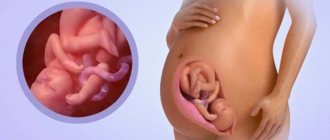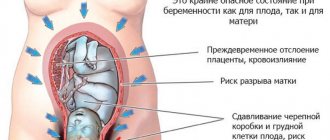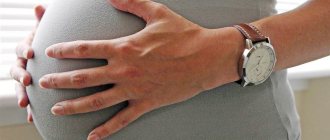Pregnancy is characterized not only by changes in the appearance of the expectant mother.
To a greater extent, changes are observed in the health and well-being of a pregnant woman, because in order to bear a healthy fetus, almost all body systems undergo serious restructuring.
Therefore, many representatives of the fair sex who are expecting a child experience lower back pain during early pregnancy.
Let's look at the reasons for this phenomenon and find out how to get rid of various pain sensations in the lumbar region.
In what situations is back pain in the first trimester normal?
If back pain is not accompanied by any additional symptoms, then most likely the causes of its occurrence are:
- Pressure of the uterus on the spinal column, tension in the muscular corset of the back. Back pain usually begins in the second or third trimester, but some women experience this symptom as early as 2-3 months of pregnancy.
- Relaxin and progesterone are hormones that are responsible for relaxing the muscles of the uterus and preventing miscarriage. However, along with the uterus, other muscle fibers also relax, in particular, the muscular corset of the back. Therefore, the degree of support for the spinal column decreases and pain occurs.
- Hard or soft non-orthopedic mattress. Or incorrect posture during sleep, staying in one position for a long time while resting.
- Also, the back may hurt after exertion, sitting for a long time at the computer, standing on your feet, an active work day spent in high-heeled shoes.
Physical inactivity and lack of vitamins and minerals can also contribute to the occurrence of pain.
One unfavorable factor can cause discomfort in the back, then the pain is usually not severe, but tolerable. And sometimes several factors act simultaneously, and the pain intensifies significantly.
What can the nature and location of pain mean? ↑
Based on these two signs, it is still difficult to guess your diagnosis, but having understood them, you will be able to figure out which doctor you should go to and how: call an ambulance, get there by your own transport, or limit yourself to a phone call.
Strong
Low back pain that is described in this way may be a sign of:
- Pyelonephritis: in this case, the temperature will rise, the general condition will worsen, the color and smell of urine will change.
- Urolithiasis: at the same time, it is impossible to find a position in which it would become easier. There will be no vaginal discharge, but visible blood may appear in the urine.
- Childbirth: at 39 weeks, a little earlier or later, pain of this nature may indicate the beginning of labor, including those accompanied by pathology. In this case, there should be a periodicity of these pains; the interval will not necessarily decrease (there are concepts of discoordinated labor, weakness of labor).
- Suture dehiscence from a previous cesarean section . If such a formidable complication of pregnancy develops, weakness will appear, pain will be felt not only in the lower back, but throughout the abdomen, there may be a sharp drop in pressure, bleeding from the genital tract, and fainting.
Read also…. Acute lumbodynia
Such pain is a reason to call an ambulance, until which you can only take a horizontal position and put a rectal suppository with papaverine.
Nagging pain
This type of pain is typical for:
- normal pregnancy, then there are no other symptoms (this needs to be confirmed with your doctor);
- pyelonephritis;
- threats of termination of pregnancy - in the early stages;
- training contractions – after 36 weeks;
- the onset of labor - in the third trimester.
Lower back pain radiating to the leg
- If such pain appears after 20 weeks, intensifies after exercise, including long walking or standing, increases after sitting in an uncomfortable position, this is a symptom of increased load on the spine and abdominal muscles by the pregnant uterus.
- Neurological diseases (osteochondrosis, intervertebral hernia, scoliosis) will also cause such a symptom, but apart from it, no discharge or changes in well-being should appear.
With such a characteristic of this symptom, an examination by an obstetrician and a neurologist is necessary.
Pain in the lower abdomen and lower back
This symptom is typical for:
- Hicks contractions (training) - in the later stages. There are no other symptoms, health does not suffer;
- threatening suture rupture from caesarean section;
- ectopic pregnancy - in the early stages;
- threats of spontaneous abortion or premature birth;
- pyelonephritis. If in all previous cases there is discharge (they are usually bloody), then in this case the temperature rises and urination is impaired.
With such a description of the symptom, calling an ambulance is mandatory.
Lower back pain on the right and left
This sign indicates a pathology of pregnancy (this may be a threat of premature birth or a threat of uterine rupture), the beginning of labor, and some pathologies of the spine (the latter usually manifested themselves even before pregnancy).
The pain of pancreatitis can be described in the same way.
Pathology of the urinary system is characterized by a certain localization (right or left).
Cramping pain
Characteristic for:
- renal colic;
- training bouts;
- real contractions;
- threats of premature birth/miscarriage.
When walking
This description of lower back pain speaks in favor of neurological diseases of the pregnant woman:
- Narrow spinal canal: pain and cramps not only in the lower back, but also in the buttocks, developing when walking. The pain spreads to the foot, lying or sitting also hurts.
- The effect of the hormone relaxin on the pelvic-sacral joints provoked before pregnancy.
Shooting
Neurological pain is described in this way:
- radiculitis;
- sciatica;
- osteochondrosis.
Less commonly, the term “shooting” is used to describe pain due to renal pathology.
In this case, the following should also appear: increased blood pressure, swelling, fever, general malaise.
Pain in the lower back, legs and pelvis
This is usually how women whose pregnancy has reached the second half describe the pressure of the pregnant uterus on the spine and bones.
This is a relatively physiological pain that should go away after childbirth.
During and after sleep
The “culprit” of such pain is often pregnancy itself, during which a woman’s hormonal background completely changes (remember, hormones affect not only the mood of women).
The situation gets worse if a pregnant woman has the following diseases:
- lumbar osteochondrosis;
- falling asleep on your back in an uncomfortable position;
- Bekhterev's disease;
- scoliosis.
Piercing
Develop due to:
- diseases of the spine;
- neuralgia: in this case, the nature of the pain changes when the body moves;
- rarely – with heart disease: such pain is accompanied by a disturbance in the heartbeat rhythm and/or a change in blood pressure;
- renal colic, in which pain spreads to the groin, perineum, leg, and is supplemented by changes in urination.
Before birth
In this case, the pain is localized not only in the lower back, but also affects the lower abdomen.
They are repeated with some frequency, reminiscent of pain during menstruation.
May be accompanied by tingling or swelling in the pubic area.
Read also…. Why does my knee hurt?
Pain in the lower back and ovaries
Since the ovaries “turn off” during pregnancy, pain in them should be alarming and cause a visit to the gynecologist.
This symptomatology is typical for:
- inflammation of the uterine appendages
- cystomas (large cysts).
- violation of the integrity of the cyst;
- twisting of the stalk of a large ovarian cyst.
In the first case, the pain is accompanied by: discharge of various (even purulent) nature, increased temperature, and health may be disturbed.
Burning
Characteristic for diseases of internal organs and the nervous system:
- pyelonephritis;
- duodenal ulcer;
- intercostal neuralgia;
- osteochondrosis.
In the lower back and tailbone
Typically, such pain occurs in a large number of pregnant women.
Those who have had a coccyx injury in the past are especially affected.
Sometimes such pain can still occur with inflammatory and tumor pathologies of the pelvic organs.
Lungs
These are the same “normal” pains that women experience due to the increased stress on the spine and bones due to their new condition.
Acute
A dangerous characteristic of pain syndrome that requires urgent diagnosis and adequate treatment, as it can occur with:
- threatening premature birth/miscarriage;
- threat of suture rupture after caesarean section;
- pyelonephritis;
- pancreatitis;
- acute appendicitis, when the appendix is displaced by the pregnant uterus.
Shingles
This is how they characterize, basically, only pancreatitis - a disease that should be treated only in a hospital, especially during pregnancy.
Frequent
This characteristic indicates:
- exacerbation of osteochondrosis;
- frequent presence of the uterus in a state of increased tone, which indicates a threat of miscarriage.
What pathologies can cause back pain?
Pregnancy is a period when a woman’s body not only undergoes restructuring, but also becomes more vulnerable to the occurrence or exacerbation of various pathologies. For example, if a woman had scoliosis before conception, it could be asymptomatic. And the resulting load on the lower back during the period of bearing a child becomes a determining factor for the rapid progression of the pathology. And here scoliosis begins to manifest itself as back pain.
If, in addition to pain, a woman has additional symptoms, this may indicate the development of diseases:
- Symptoms of dyspepsia and digestive disorders, weight loss, pain under the ribs - pathologies of the digestive system.
- Impaired urination, blood in the urine, increased body temperature, acute pain in the lumbar region and lower abdomen - pathologies of the urinary system.
- Sharp, shooting pains in the back, chest, neck. As well as limited movement, numbness of the limbs, dizziness - diseases of the musculoskeletal system.
If pain in the lower back is accompanied by bleeding from the vagina, this may be a symptom of an impending miscarriage. In any case, if a woman is worried or alarmed by any symptoms, she should consult a doctor. Only a specialist can answer the question of why your back hurts and take prompt and adequate measures to eliminate the symptom.
What are the reasons for pain? ↑
Often, pregnant women are bothered by lower back pain due to active restructuring of the body. But, feeling the pain, the expectant mother begins to make her own assumptions about the cause of its appearance.
Having come up with a diagnosis for herself, a pregnant representative of the fair half of humanity is able to self-medicate, which, of course, rarely ends well for the woman’s well-being and health.
Initially, in order to get rid of annoying pain in the lower back, you should find out the cause of their occurrence, and only then begin treatment.
Let's consider the possible causes of pain in the lumbar region in the early stages of pregnancy.
In the first weeks
Doctors note that many women experience lower back pain at the first signs of pregnancy.
One might even say that this symptom indicates the interesting situation of a woman even more eloquently than constant nausea and dizziness.
The thing is that even at the very beginning of pregnancy, a significant restructuring of the body begins and the adaptation of all its systems to the new position.
Thus, all energy resources are spent on getting used to the new situation and safely bearing the child.
So that the mother feels comfortable with her growing belly, the restructuring of the lumbar spine begins, because in the future it will have to take on a significant load in the form of the fetus.
As a result, in the first weeks of pregnancy, mild pain may occur, which will not cause significant discomfort.
5 weeks
If mild pain in the lumbar region occurs at this stage of pregnancy, there is also no need to worry.
It is during this period that relaxation of the sacral region, which is located in the lumbar region, is observed.
Thanks to the relaxant hormone, which helps relax the ligaments and hip joints, the sacral region becomes more mobile. This may cause minor pain in the lumbar region.
This phenomenon, provided by nature, helps to maintain balance and not feel discomfort due to the excessive weight of the fetus in the future.
Therefore, if in the fifth week you feel mild pain in the lower back, know that this contributes to the further normal bearing of the child.
6 weeks
Just as in other cases, lower back pain at 6 weeks of pregnancy often occurs due to softening of the supporting ligaments of the sacrum.
In addition, as doctors note, this period is characterized by an increase in the body's production of the hormone progesterone, which has an excessive relaxing effect on the lumbar spine.
Lower back pain can spread to your legs with a sedentary lifestyle.
Therefore, try to move more during the 6th week of pregnancy.
Doctors note that lower back pain in the first trimester of pregnancy cannot significantly affect the well-being of the expectant mother, since they are not intense.
But if you feel severe pain in the lower back, which can even cause dizziness and severe malaise, this is a serious reason to consult a doctor.
Such symptoms may indicate dangerous diseases of the urinary system.
7 weeks
In the seventh week of pregnancy, the ligaments that support the uterus actively expand, resulting in the entire lumbar spine being in a tense state.
Therefore, at this stage of pregnancy, women often experience a nagging, mild pain that does not cause much discomfort.
But if pain in the lower abdomen is added to the pain in the lumbar region, then you should be wary.
Especially if these pains are also accompanied by increased body temperature.
These symptoms may indicate an aggravated inflammatory or infectious process in the kidneys.
It is worth saying that inflammatory or infectious diseases can significantly harm the health of the fetus and even provoke a miscarriage, so you should not self-medicate, but consult a doctor at the first warning signs.
8 weeks
This period is often accompanied by lower back pain.
In addition, pain can be localized throughout the pelvis, which is explained by increased sensitivity of the sciatic nerve, which is directly related to the hip bone and lumbar spine.
Therefore, during the entire 1st trimester of pregnancy, a woman may not be left with nagging pain in the lower back.
But if there are also bladder diseases, then this can also be accompanied by lower back pain.
Frequent urge to urinate, swelling, and increased body temperature signal the onset of an inflammatory process in a woman’s urinary system.
These symptoms must be immediately eliminated, because they can cause significant harm to the undeveloped fetus.
How is spondylosis deformans diagnosed? You will find the answer in our article. How many bones are in the human skeleton? Read in this material.
9 weeks
As mentioned above, pain in the lumbar region during pregnancy does not pose a serious threat to normal gestation, since it only indicates a necessary restructuring of the body.
But doctors note that sometimes in the 9th week of pregnancy, women, in addition to pain in the lower back, may experience bloody or brownish discharge from the vagina.
If they are released in small quantities and do not cause discomfort, then this may be due to the fact that the sciatic nerve is putting too much pressure on the uterus. There is nothing wrong with this, doctors assure.
But if there is heavy bleeding from the vagina, and you feel intense pain, you should urgently visit a doctor, as these symptoms may be harbingers of a miscarriage.
10 weeks
During this period of pregnancy, there is a rapid enlargement of the uterus and, at the same time, active growth and development of the baby in the womb.
It becomes more and more difficult to bear a child, because the weight of the fetus increases, and accordingly, the belly becomes larger.
To maintain balance when walking, a woman has to make some effort by stretching her neck forward and arching her spine. It is walking in this position that can provoke lower back pain, according to doctors.
The spine is under constant tension, and along with it, the lumbar region is also tense.
But the pain should not be acute; rather, some fatigue will be felt in the lower back.
If intense pain is repeated day after day, this may indicate the presence of serious diseases of the urinary system.
11 weeks
As a rule, the eleventh week of pregnancy may be accompanied by more intense pain than before.
There is nothing strange about this, because the load is distributed unevenly across the spine. Accordingly, pain in the lumbar region intensifies.
It is worth saying that it is the lumbar spine that in this case bears the greatest load, which can be transferred to the hips.
If your legs hurt and swell along with your lower back, then you don’t have to worry, because in the eleventh week of pregnancy this pattern is considered normal.
12 weeks
The last week of the first trimester may also be marked by discomfort in the lumbar region.
This is due to the fact that under the pressure of the fetus, the ligaments begin to gradually stretch, which affects the lumbar spine. As a result, mild pain may be observed, which does not cause discomfort to the expectant mother.
But if such pain is intense, know that this symptom can be triggered by a genitourinary infection.
In this case, in addition to pain in the lumbar region, you may be bothered by frequent urination.
How is thoracic osteochondrosis treated at home? Find out from our article. How to treat intercostal neuralgia with medication? See this material.
What is hygroma of the wrist joint? Information here.
What to do if you constantly have back pain in the first trimester
Treatment of back pain in the first trimester mainly consists of normalizing lifestyle, improving living conditions, and using safe methods of therapy. As a last resort, the doctor may prescribe mild painkillers approved for pregnant women.
What to do to alleviate your condition yourself:
- Do simple gymnastics and yoga for pregnant women. It is advisable that classes take place in the presence of an instructor. You can practice individually or in a group with other pregnant women.
- Rest more, go for walks in the fresh air.
- Eat properly and fully. It is better to switch to a diet that includes foods rich in calcium. This includes dairy and fermented milk, nuts, fish and meat, and greens. The main thing is to ensure that food allergies are not added to back pain, so it is better to exclude exotic foods.
- Take a pharmacological vitamin-mineral complex or fortified herbal medicines prescribed by your doctor.
- Choose the right orthopedic mattress (medium hardness, elastic, made from natural materials).
- Consult your doctor about the best sleeping position. Experts usually recommend sleeping on your left side, with pillows under your head and between your knees. As the uterus grows, a pillow is also placed under the abdomen.
- To support your back, you can wear an individual bandage that does not put pressure on the abdominal area.
- Put off all shoes and high-heeled boots until next year. Preference should be given to lightweight flat-soled shoes.
- Start visiting the pool.
- Before going to bed, it is useful to take a relaxing warm bath, which can be combined with aromatherapy.
- Some women find that a gentle back massage using a gentle stream of warm water in the shower helps.
- The sore spot can be treated with topical preparations (ointments, creams). The main thing is that these products are approved for use during pregnancy.
The best advice a pregnant woman can get for back pain is the advice of a doctor. After all, specialists know everything about pregnancy and can suggest unexpected solutions to alleviate the condition of the expectant mother.
Uncomfortable sensations and pain in the chest
Chest pain during pregnancy is a kind of preparation and restructuring of the female body for the development of the embryo, which is the most normal sign of pregnancy. As a rule, a woman begins to feel chest pain much earlier than she finds out that she is pregnant.
You may be interested in: False contractions before childbirth
During pregnancy, breasts increase in size by two sizes on average, thus preparing the female body for breastfeeding. To relieve breast pain during pregnancy, wear comfortable, wire-free bras and reduce your salt intake, which retains salt in the body.
Which specialist should I contact for back pain in the first trimester?
To immediately eliminate the threat of miscarriage, it is better to first consult a gynecologist. If everything is normal in this regard, you can contact a therapist who will conduct an examination and then refer the woman to a specialist.
If the expectant mother has back pain, she may need to be examined:
- Gastroenterologist.
- Vertebrologist.
- Neurologist.
You may have to undergo tests and an MRI to determine the cause of the unpleasant symptom.
How we feel in the first trimester of pregnancy
Pain in the first trimester of pregnancy is quite normal. Just think about the fact that your body is completely rebuilt and a new life is born inside it, but you should also remember that there are different types of pain and you still need to seek help from a specialist.
As for the aching pain in the lower abdomen, you can even do an ultrasound of the pelvis to rule out pregnancy fading or take a hCG test. But strange sensations in the abdomen can be explained very harmlessly, because at the beginning of pregnancy the pelvic organs begin to change their position, and ligaments are also stretched.
So, we can conclude that pain is completely normal and natural. Any gynecologist will tell you that pain is the primary sign of pregnancy, the result of which is more obvious than any test. At the moment when the egg and sperm unite to form the fertilized egg, the sensations are almost imperceptible, but as soon as they unite, they need to attach to the wall of the uterus, in other words - to be imported. The woman begins to feel primary pain, somewhat reminiscent of menstrual pain. As soon as our body adapts to the new state and location, the pain should stop.
You may be interested in: Breast swelling during pregnancy
What not to do for back pain in the first trimester
During pregnancy, you should absolutely not self-medicate. Taking any medications, even in small doses, means exposing the child’s health to enormous risk. But you cannot ignore your condition, because some pathologies require urgent, sometimes surgical, treatment.
It is also not recommended for a pregnant woman to:
- Massage the sacrum area vigorously yourself, or ask a loved one to massage it - this can cause a dangerous increase in the tone of the uterus.
- Take a hot bath to relax.
- Do hard work, including housework.
- Apply any preparations for external use with a warming effect to the lumbar area. Use a heating pad with hot water, make warming compresses - that is, warm the lumbar and sacral area in any way.
Back pain during pregnancy worries many expectant mothers. And usually its occurrence is not associated with the course of pathological processes. A woman’s body reacts this way to the changes that occur to her body during the period of bearing a baby, or a pregnant woman simply sleeps on an uncomfortable mattress and wears high-heeled shoes. Each case is individual, in order to establish the cause of the pain and exclude the development of dangerous diseases, you need to visit a gynecologist and tell him about the problem that has arisen.
When not to worry
If aching pain occurs at the very beginning of the period, this is most likely due to the transformation of the uterus, into which the fertilized egg has recently descended and attached to its wall. At this time, the ligaments in the uterus become tense, stretched, and the nerve endings are affected. There is no need to worry at this time.
Throughout early pregnancy, the uterus grows rapidly, which also leads to some discomfort. Sometimes painful sensations occur periodically and go away after a while. Even at an early stage, osteochondrosis may remind itself if the woman previously suffered from it.
With bloating, unpleasant symptoms in the lumbar region are also observed. It goes away after digestive problems are eliminated, so it does not cause concern.
In later stages, nagging pain in the lower back in pregnant women is not a rare phenomenon. Here the main role is played by the increase in the mass of the fetus, which puts pressure on the internal organs and makes a significant preponderance of the abdominal cavity. The back muscles are under constant tension, and the functionality of the kidneys and genitourinary system is difficult. Maximum load on the cardiovascular and digestive system. This provokes painful symptoms in the lower back during pregnancy.
Closer to 40 weeks, cramping sensations may appear, radiating to the lower back, which indicates the approach of a happy day when the baby is born.










